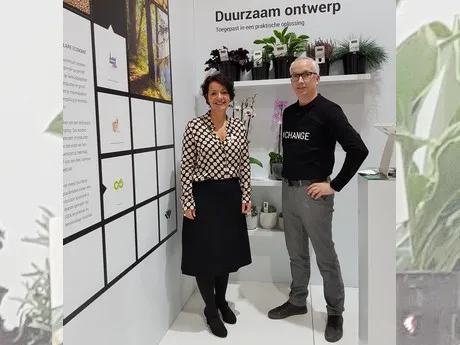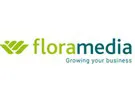A lot is possible, but in the end we will have to accept that the sustainable alternatives to plastics are just a little bit different than we are used to. That also applies to something small like a plant label, according to Judith Klute (art director) and Michel Braan (product developer), Floramedia. The company is one of the largest producers of plant labels in Europe, and the plastic issue is prominently on the agenda. What's more, they have formulated serious ambitions, and, according to themselves, want to be front runners in developing sustainable alternatives.

No more traditional plastics in 2030
A few years ago, Floramedia started a project group, with as assignment to map what exactly the own role in that sustainable future will be. What are the opportunities, what has to and what is possible, what are realistic objectives? An extensive, long-term project, which recently resulted in the presentation of 'Our Green White Paper', in which development and vision were presented. In December 2020, the target date of the company, at least 50% of the total turnover will consist of sustainable materials. In 2025 that will be 75%, in 2030 100%. As of 2020, recycled plastic will be offered by default; as of 2030, no traditional, virgin plastic will be offered.
Sustainable solutions and commercial feasibility
Judith: "It is a project in which the entire company is involved. Michel and his colleagues are researching what is technically possible, and I am looking at what is, in consultation with the customer, creatively possible. How serious is his question, what does he want, and what are his exact motivations? These questions did not get any attention three years ago, now it is a daily affair. It is nice to see how quickly that has changed, and it is a challenge to find that specific balance again and again between sustainable solutions on the one hand, and commercial feasibility on the other."
The future of plastic labels
Michel: "Concretely, we can ask ourselves whether plastic labels will ever be really gone. The future is a crystal ball and what the answer or combination of answers is, no one knows. Partly, we will find that answer in new materials. Think about bio-based plastics made from sugar cane or cellulose, a vegetable material gained from trees. For another part, we depend on product innovations, such as the 'Multi-Slot', a label which can be produced 40% thinner than the usual label, and still can be fixed properly to the plant raising trays. And for yet another part we depend on recycling."
Question of mentality
At last, it is not a question about how or what, according to Michel and Judith, but a question of mentality. That has to change, both on the part of the consumer and of the producer. Michel: "We have to look differently at a number of products. You can drive an electric car and go to France for a holiday, but you have to accept you will arrive a bit later because you need to take charging breaks regularly. In the same way, there are beautiful alternatives for plastic, but we have to accept that they, for example, are less sturdy at the moment.
More expensive?
That everybody in the green sector will just accept that might be a bit of an idealistic thought, but more and more often there is also a pragmatic side. Judith: "For a part, everybody has to join, while at the same time this also pays off. The switching from plastic to a more sustainable material is not more expensive per se, but has to be seen as an investment. The grower may have to adjust his process, add the label a little later, or fix it in a different way. That sure is extra labor, but it will pay for itself because less plastic is used."
For more information:
FloraMedia
Kleine Steng 1
1551 NC Westzaan
Netherlands
T: +31 (0)75 – 64 76 476
F: +31 (0)75 – 64 76 449
E: info@floramedia.nl
www.floramedia.com
